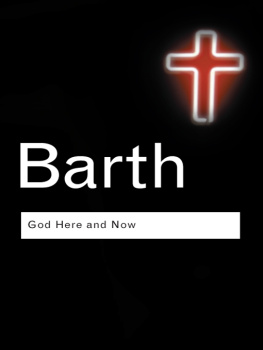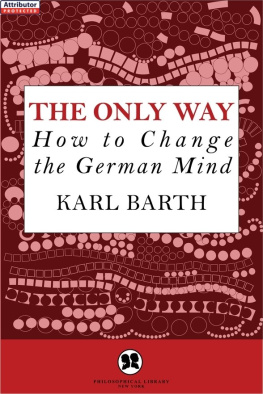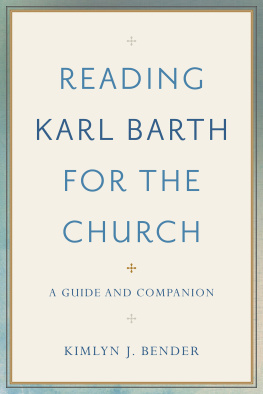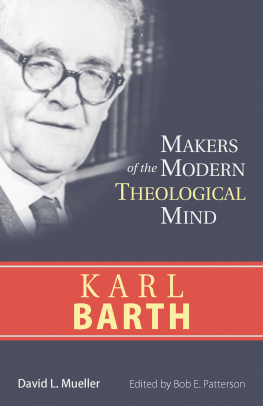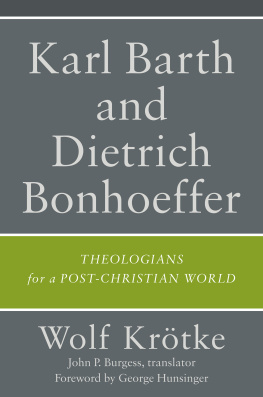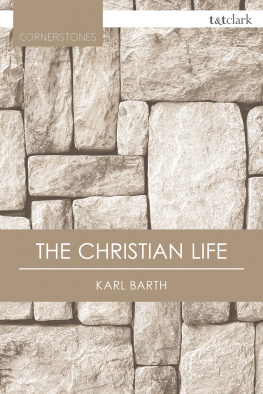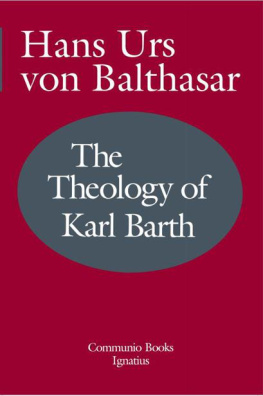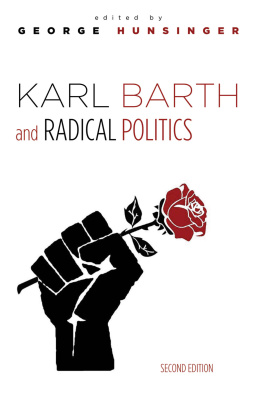TRANSLATORS INTRODUCTION
The seven addresses here translated were originally delivered within the past fifteen years by the Swiss theologian Karl Barth before such diverse audiences as the Amsterdam Assembly of the World Council of Churches and a select gathering of secular European intellectuals. The selection and arrangement of the material by the author and the editor of this volume are designed to give a fair presentation of Barths mature thought. I have done my best to reproduce something of his personal style as well as the content of his thought in English, but I am left with the conviction that the major task of translating Barth for Americans must finally be accomplished by each reader for himself. American readers may be helped to appreciate both the power and the problem of Barths theology, however, by an introduction from one American who studied for three years with Barth, who followed loyally in his teachers steps for some time, but who has found the Barthian path increasingly difficult to discern in the American scene.
Barth deserves the attention of anyone interested in Christian thought in our century. He is the most influential theologian since Schleiermacher, and more than any other man he has revitalized and set the terms for Protestant theology since the end of the First World War. Protestants will only rightly assess Barth, however, when they take note of the fact that for some years he has been attracting increasing attention from Roman Catholic theologians, and it is at least conceivable that Barths thinking may eventually find among Catholics its most fertile soil. Catholics as well as Protestants have noticed in Barth a man in intimate conversation with a long past, especially with the past of the sixteenth century, but reaching back also to the medieval School-men and the ancient Greek and Latin Fathers, and including above all others the biblical authors. Americans may feel that Barth is a man for whom the turning point in theology and thought lies in the first half of the sixteenth century, rather than in the second half of the eighteenth century, where we might be more inclined to locate it. Yet if we would learn something of what it is like to be a man of the twentieth century in intimate conversation with the long past of theology (and thereby perhaps learn something more of that past than is easily discernable from these New World shores) it will be worth our while never to dismiss this man as a relic of an antique world or as a conservative or reactionary who will not move with the times. He may even help us to overcome what some might call our myopia sufficiently to enable us to notice that there have been other men of faith before us who have wrestled with many problems which we face. He may even help us to be helped by them. At the least, we may be shown something of the glory of the ancient tradition of the apostles and martyrs and Fathers, filtered through the Reformers of the sixteenth century, and commented on and presented to us by a brilliant contemporary traditionalist.
Barth, as these essays make plain, is a theologians theologian. His Church Dogmatics is of course a gold mine for theologians, a veritable encyclopedia of theological reflection from all ages, skillfully and profoundly expounded by an able man. But primarily, Barth stands as a theologian in the service of preaching. Preaching, as he conceives it, is an activity which takes place between the biblical texts and their faithful hearer. Time does not affect this picture; Barth seems to conceive of the preacher as a man without dates in history who is seeking to hear just what the biblical texts said of old, and who, having heard, stands up to pass on precisely what he has heard. This faithful listener who has become the preacher is only a mailman, Barth says, delivering a letter which he has neither written nor altered. He is an amateur trumpeter, and no matter how unskilled he may be, his trumpet will awaken the sleepers.
There is an indubitable power here just because Barth refuses to ask about the mailmans ability to read the letter to an illiterate recipient or to translate it into the native language. He likewise refuses to ask more than that we let the trumpet sound its own note, regardless of what tune we might like to hear or play. He refuses to consider the questions of how men use and understand language and whether this changes with time and situation, and consequently he is able to concentrate on what is said to men in the gospel. The result is not only a sure voice that never quavers with doubt; it is one which has at its command all the wealth of past ages of assurance. In no small measure because of this refusal to stand between us and the past with which he is in conversation, Barths theology is powerful.
As Americans listen to him in this conversationand a brilliant conversationalist is always a joy to hearthey will be tempted to be typically themselves and ask, But is he in conversation with us? By refusing to consider the way we use words today and the categories with which we think, has he not shut us out of his conversation? What are we to make of the metaphor of the trumpet? It may surely wake men, but will it wake them to attack or to retreat? Is it not more likely still that they will simply groan and roll over at the strange noise of uneven, meaningless notes? These peculiar metaphors and the questions which they raise in us reveal both the power and also the problem of Barth as a guide for contemporary American Christians. Only history can tell whether Barths thought will prove powerful and helpful in America. The problem lies in his neat separation of the how of language from the what . Can a word, whether called human or divine, really be considered as a package which bears its own meaning wrapped inside it? Are the analogies of a letter carried by a mailman or a trumpet blown by a novice really to the point? Whatever our doubts, Barth stands before us in the posture of one stuffing a letter into our mailbox or blowing a blast on the trumpet. Certainly we can at the very least learn from him what it was that postmen in earlier ages were delivering to people on their mail routes, and this is surely part of what we should appropriate if we would understand the heart of the matter with which both Barth and American theologians are concerned. Each reader will have to decide for himself if the message comes through to him in such a way that he can make it his own. It may be added that it has been the puzzling experience of some who would claim that this has happened to them, thanks to this particular Swiss mailman, that the mailman has not been too pleased when they have seriously tried to understand the message in their peculiar American way. Be that as it may, let us turn now to the letter the mailman would deliver.
God Here and Now , really God and really here and now : that is what Barth has to say; that is the trumpet call. The other way in which he says this is simply: the name Jesus Christ. That one man in the midst of all other men is all that matters, and so the proclamation of this man as the form and content of God Here and Now is Barths only concern. In the first chapter Barth is speaking to contemporary humanists of every conceivable persuasion. He is completely himself, with his foundation firm and clear. He does not hesitate, therefore, to meet his hearers this far: the message of the gospel may also be called a sort of humanism, but one which arises out of the acknowledgment that Gods here and now in the person of the man Jesus defines every man in his here and now. The faithful hearer of the biblical message, as Barth sees it, has no right to enter into any discussion of man in general. He can speak only on the basis of one particular man, and if that man is proclaimed, Barth concludes, he will prove his own point.

